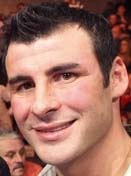Good, bad, ugly in British boxing

Even during better times, such as in 2006, promoter Frank Warren and fighter Joe Calzaghe didn't appear to be particularly close. Photo / Ed Mulholland-fightwireimages.com
The rich history of the city of London has provided the backdrop for an inter-linked series of boxing sagas that should be titled The Good, The Bad and The Ugly.
For the past few weeks, everything that is right and wrong and compulsive about the fight game has been laid bare in front of a British public that needs some kind of distraction from the social and financial crises ripping through its fabric.
Feelgood stories are what society craves in times such as these and Britain, with its soaring crime rates and crashing economy, has reacted accordingly.
Ricky Hatton’s promotional tour of his homeland, accompanied by his May 2 opponent Manny Pacquiao, was the type of tale that struck a chord with a population in need of some cheer.
Hatton, the working class boy made good, has always had that kind of effect. His immense popularity could be measured in the tens of thousands of loyal followers who journeyed to Las Vegas to watch him record his first career loss, against Floyd Mayweather Jr. in 2007.
Combined with Pacquiao, a quieter and more reserved but equally charismatic character, the impact of their tour in the United Kingdom was huge.
The Imperial War Museum was packed with media for a head-to-head press conference. Westminster Cathedral was filled with Filipino fans when Pacquiao attended Mass. Supporters and well-wishers turned out in their thousands wherever the men went, providing ultimate evidence that boxing is far from dead – when the best fights can be made.
However, while Hatton and Pacquiao challenged each other to a darts contest (both fighters are fans of the game), across town a far less savory boxing spectacle was taking place.
Lightweight hopeful Amir Khan’s bout with Marco Antonio Barrera on March 14 is the next major fight night to take place in Britain, but the preparations for that event have been overshadowed by an unsightly court case that does boxing no favors.
Much talk has been generated by newly-retired RING light heavyweight champion Joe Calzaghe and his ex-promoter Frank Warren having spent the last two weeks locked in a bitterly-contested legal fight at the High Court.
Accusation and blame was hurled backward and forward between Calzaghe and Warren via their legal representatives, with, of course, money at the root of it all.
Warren was attempting to sue Calzaghe, insisting the Welsh fighter had gone back on an agreement to allow Warren to stage his future fights. Instead, Calzaghe promoted his November victory over Roy Jones Jr. himself.
Calzaghe launched a counter-claim for what he claimed were unpaid fight purse revenues from his split-decision win against Bernard Hopkins last April.
A verdict is expected this week, but whatever the outcome, one thing is certain – boxing will be the loser.
The positive vibes created by Hatton and Pacquiao were offset by public resentment surrounding what is widely seen as a greedy dispute between a millionaire boxer and a millionaire promoter.
For as long as cases like this stain the boxing landscape, the perception that the sport is riddled with dishonesty, politics and back-stabbing will not go away.
Perhaps it is little wonder that in this environment there has emerged the unlikeliest of heroes.
An ailing British heavyweight division has been ignited by Martin Rogan, a 37-year-old taxi driver from Belfast, Northern Ireland. Rogan only took up pro boxing four years ago but parlayed his victory in a Prizefighter competition on television into a Commonwealth title.
Rogan has already beaten former Olympic gold medallist Audley Harrison and WBA heavyweight title contender Matt Skelton and has now set his sights on a European crown.
Rogan looks more like a street fighter with his ugly yet combative style and does not have the technical skills to challenge on the world stage, yet his incredible courage and a willingness to absorb punishment has generated him widespread support.
In these troubled times, a battling mentality from a limited warrior will resonate with a public fighting its own uphill battles.
Boxing in Britain is fighting a battle of its own and it is sadly predictable that every forward step seems to be matched with a backward one.















